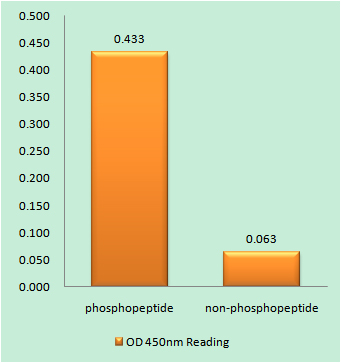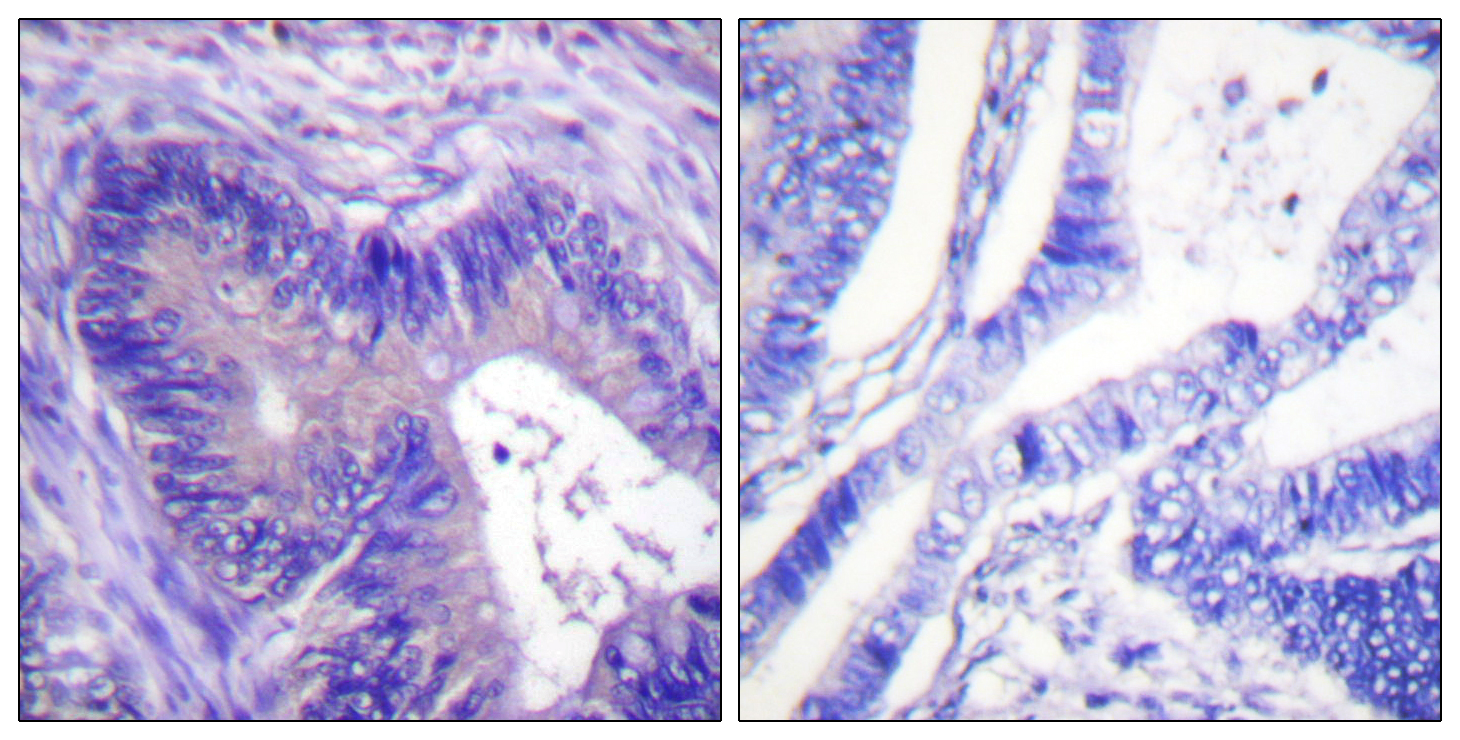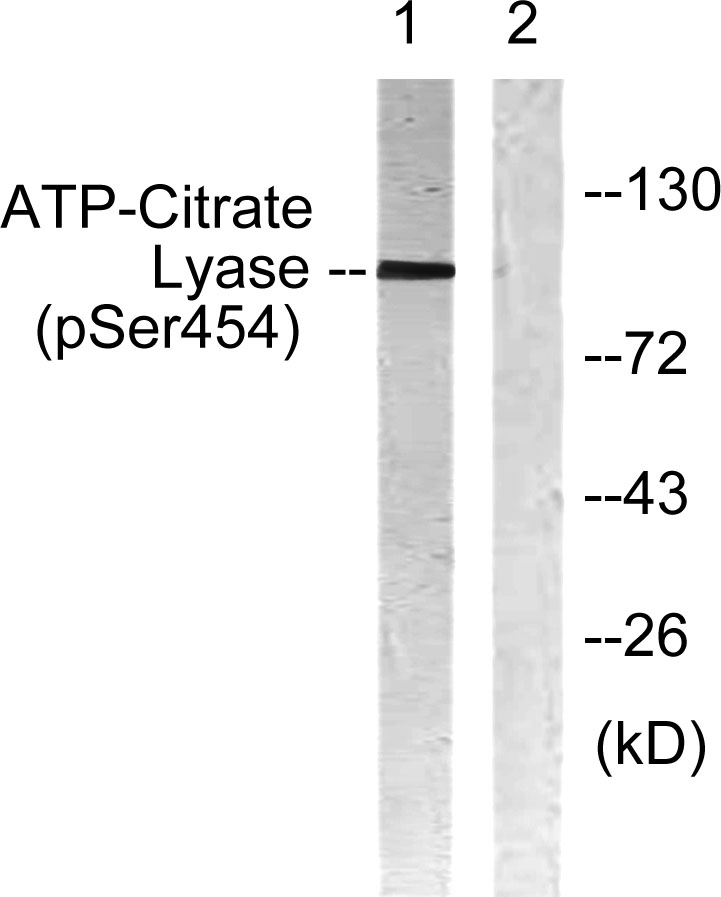ATP-citrate synthase (phospho Ser455) Polyclonal Antibody
- Catalog No.:YP0686
- Applications:WB;IHC;IF;ELISA
- Reactivity:Human;Mouse;Rat;Monkey
- Target:
- ATP-citrate synthase
- Fields:
- >>Citrate cycle (TCA cycle);>>Metabolic pathways
- Gene Name:
- ACLY
- Protein Name:
- ATP-citrate synthase
- Human Gene Id:
- 47
- Human Swiss Prot No:
- P53396
- Mouse Gene Id:
- 104112
- Mouse Swiss Prot No:
- Q91V92
- Rat Gene Id:
- 24159
- Rat Swiss Prot No:
- P16638
- Immunogen:
- The antiserum was produced against synthesized peptide derived from human ATP-Citrate Lyase around the phosphorylation site of Ser454. AA range:420-469
- Specificity:
- Phospho-ATP-citrate synthase (S455) Polyclonal Antibody detects endogenous levels of ATP-citrate synthase protein only when phosphorylated at S455.
- Formulation:
- Liquid in PBS containing 50% glycerol, 0.5% BSA and 0.02% sodium azide.
- Source:
- Polyclonal, Rabbit,IgG
- Dilution:
- WB 1:500 - 1:2000. IHC 1:100 - 1:300. ELISA: 1:10000.. IF 1:50-200
- Purification:
- The antibody was affinity-purified from rabbit antiserum by affinity-chromatography using epitope-specific immunogen.
- Concentration:
- 1 mg/ml
- Storage Stability:
- -15°C to -25°C/1 year(Do not lower than -25°C)
- Other Name:
- ACLY;ATP-citrate synthase;ATP-citrate;pro-S-)-lyase;ACL;Citrate cleavage enzyme
- Observed Band(KD):
- 125kD
- Background:
- ATP citrate lyase(ACLY) Homo sapiens ATP citrate lyase is the primary enzyme responsible for the synthesis of cytosolic acetyl-CoA in many tissues. The enzyme is a tetramer (relative molecular weight approximately 440,000) of apparently identical subunits. It catalyzes the formation of acetyl-CoA and oxaloacetate from citrate and CoA with a concomitant hydrolysis of ATP to ADP and phosphate. The product, acetyl-CoA, serves several important biosynthetic pathways, including lipogenesis and cholesterogenesis. In nervous tissue, ATP citrate-lyase may be involved in the biosynthesis of acetylcholine. Multiple transcript variants encoding distinct isoforms have been identified for this gene. [provided by RefSeq, Dec 2014],
- Function:
- catalytic activity:ADP + phosphate + acetyl-CoA + oxaloacetate = ATP + citrate + CoA.,function:ATP citrate-lyase is the primary enzyme responsible for the synthesis of cytosolic acetyl-CoA in many tissues. Has a central role in de novo lipid synthesis. In nervous tissue it may be involved in the biosynthesis of acetylcholine.,similarity:In the C-terminal section; belongs to the succinate/malate CoA ligase alpha subunit family.,similarity:In the N-terminal section; belongs to the succinate/malate CoA ligase beta subunit family.,subunit:Homotetramer.,
- Subcellular Location:
- Cytoplasm, cytosol .
- Expression:
- Brain,Epithelium,Hippocampus,Liver,Lymph,Platelet,
- June 19-2018
- WESTERN IMMUNOBLOTTING PROTOCOL
- June 19-2018
- IMMUNOHISTOCHEMISTRY-PARAFFIN PROTOCOL
- June 19-2018
- IMMUNOFLUORESCENCE PROTOCOL
- September 08-2020
- FLOW-CYTOMEYRT-PROTOCOL
- May 20-2022
- Cell-Based ELISA│解您多样本WB检测之困扰
- July 13-2018
- CELL-BASED-ELISA-PROTOCOL-FOR-ACETYL-PROTEIN
- July 13-2018
- CELL-BASED-ELISA-PROTOCOL-FOR-PHOSPHO-PROTEIN
- July 13-2018
- Antibody-FAQs
- Products Images

- Enzyme-Linked Immunosorbent Assay (Phospho-ELISA) for Immunogen Phosphopeptide (Phospho-left) and Non-Phosphopeptide (Phospho-right), using ATP-Citrate Lyase (Phospho-Ser454) Antibody

- Immunohistochemistry analysis of paraffin-embedded human colon carcinoma, using ATP-Citrate Lyase (Phospho-Ser454) Antibody. The picture on the right is blocked with the phospho peptide.

- Western blot analysis of lysates from COS7 cells treated with Calyculin 50nM 30', using ATP-Citrate Lyase (Phospho-Ser454) Antibody. The lane on the right is blocked with the phospho peptide.



